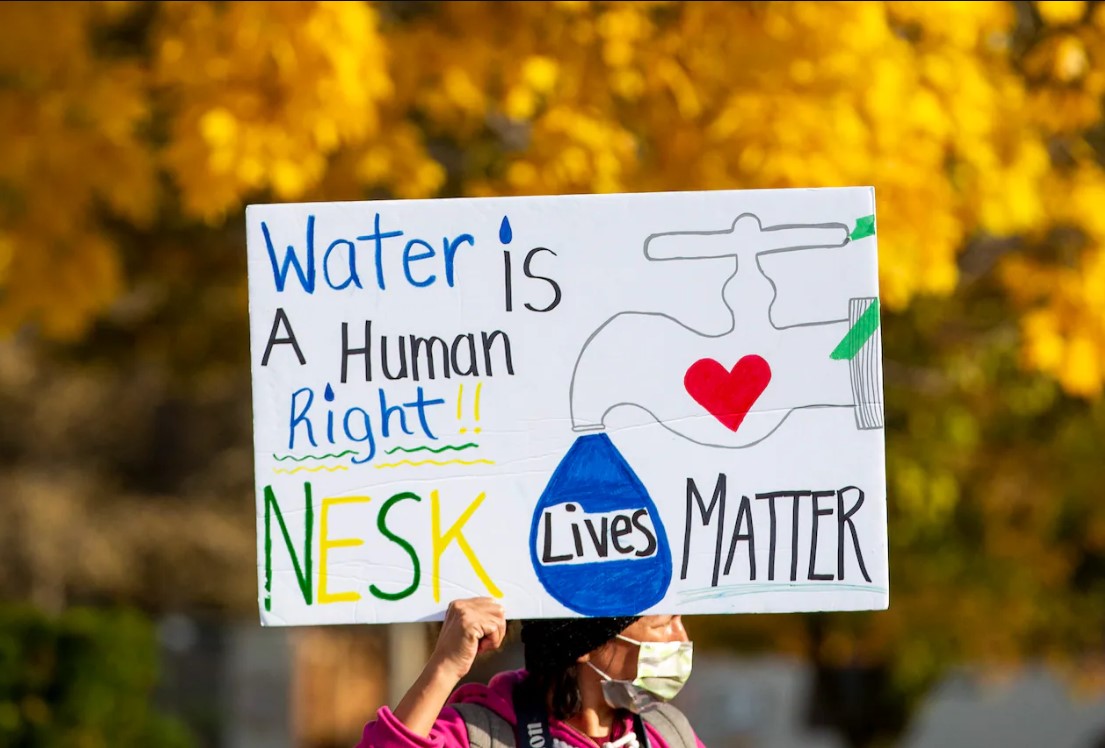10,000 days and counting: Decades-long drinking water advisory continues for Neskantaga First Nation
Contaminated tap water sparks questions about environmental racism and overall healthcare inequity faced by Indigenous communities.
On June 22, 2022, the Neskantaga First Nation, a community containing approximately 300 people, “marked its 10,000th day under a drinking water advisory,” reads a CBC news report. Members of the Northwestern Ontario-based community have been drinking unclean tap water for almost three decades—longer than any other First Nation community in the country’s history.
The contaminated water has caused residents of the Neskantaga First Nation numerous health issues, such as skin rashes and sores. Mental distress has also been prevalent within the community, with a woman committing suicide while retrieving water from the faulty treatment plant.
In an interview with CBC, Chris Moonias, former Neskantaga chief, says that the drinking water problem began in the early 1990s. Although newly built, the government-funded water treatment facility proved to be unreliable soon after its construction. Since then, the community has endured decades of a boil-water advisory, as boiling unclean drinking water reduces the likelihood of contracting serious illness.
The Liberal government had previously contracted companies to repair the Neskantaga’s water treatment plant. In 2017, Kingdom Construction Limited was hired to upgrade the plant. However, the company failed to meet deadlines, and thus had their contract terminated in February of 2019. In April of 2019, Razor Contracting took over work on the plant. In spite of the repairs made on the plant, an “oily sheen” was found in the Neskantaga’s water reservoir in October 0f 2020, which prompted evacuations. Speaking to the CBC, Moonias stated: “Every time we fix something […] something else breaks.” He believes that the best solution is for the government to replace the old system, rather than only repair it. He adds that, unless the Canadian government provides a lasting solution to the community’s water problem, the Neskantaga First Nation will keep its boil water advisory in place.
The Neskantaga community’s water disparity is considered a form of environmental racism—a term used to describe the disadvantages that racialized and minority groups face due to disproportionate environmental policies. According to the United Nations’ report in 2020, Canada’s Indigenous population endures environmental conditions that would be considered unacceptable for other communities in the country.
Like the Neskantaga community, many First Nations groups across Canada experience environmental racism in the form of water pollution. An example is the Pictou Landing First Nations community living in Boat Harbour, Nova Scotia, whose water has been contaminated by pulp mill run-off since not long after the plant’s opening in 1967.
Contaminated drinking water is an example of only one of the health disparities that First Nations communities experience in Canada. The accessibility of healthcare services is another issue—one that heightened during the Covid-19 pandemic. According to a Statistics Canada report concerning Indigenous Peoples living off reserve, 43 per cent of Indigenous Peoples reported difficulty booking appointments with healthcare providers, as compared to 37 per cent of non-Indigenous people. Travel restrictions during the pandemic, as well as insufficient transportation services, made seeking healthcare even more difficult. Additionally, the services that Indigenous Peoples do receive are not tailored to their cultural values and needs. As a result, many do not receive adequate or appropriate medical treatment.
The pandemic has also exacerbated mental health struggles—which are more prominent within Indigenous communities than their Indigenous counterparts, affecting approximately “one in five Indigenous adults”, as opposed to “one in ten non-Indigenous adults” as depicted in the report.
Years have passed as environmental racism and healthcare inequality remain a cause for Indigenous communities across Canada to endure physical, psychological, and emotional health disparities. In August of 2022, following its visit to the Neskantaga First Nation, Indigenous Services Canada implemented the “Trust the Taps” program, which aims to assist the Neskantaga First Nation in recovering from trauma created by unclean drinking water.
Staff Writer (Volume 50) — Maryam is a third-year student completing a double major in English and Professional Writing & Communication. She started her journey with The Medium in 2022, where she’s written articles for News, Opinion, Features, and Sports. In her spare time, Maryam enjoys painting, cooking, and finding creative ways to educate people about world issues that matter to her.


